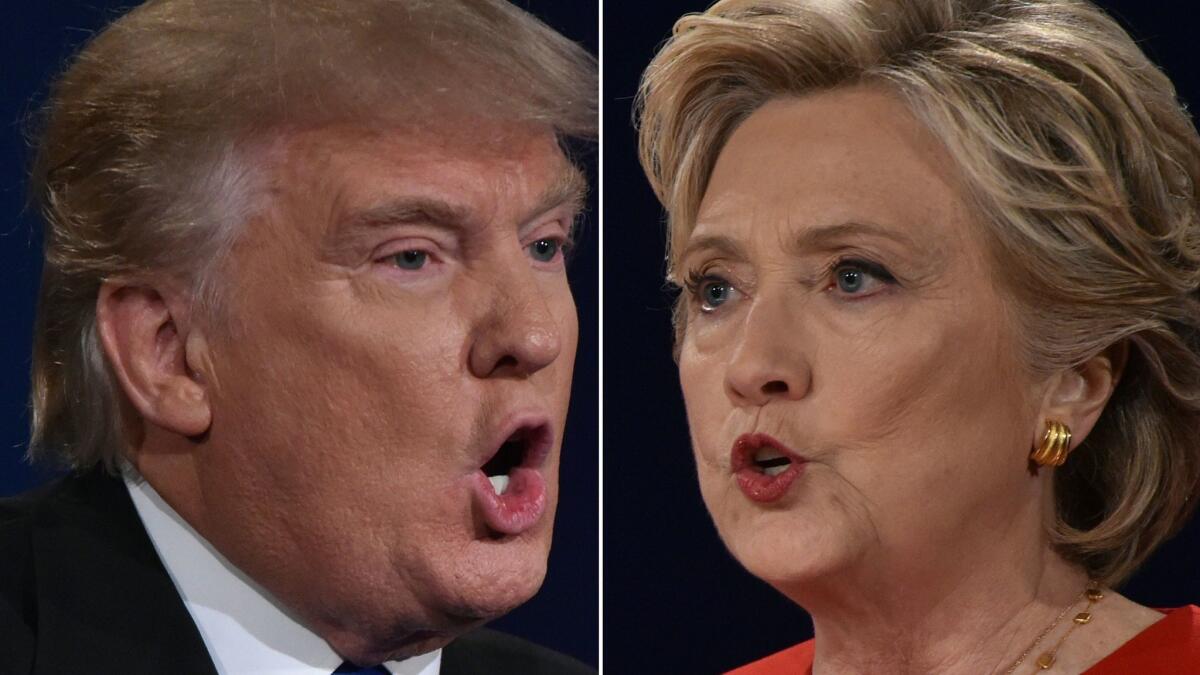Analysis: Trump vs. Clinton: Why are we still obsessed a year later?

It’s the election America just can’t quit.
One year later, much of the country continues to obsess over Trump vs. Clinton, as though still seated on the couch, eyes agoggle, watching the final decisive returns trickle in from Pennsylvania and Wisconsin.
This is not normal.
Normally, campaigns have an expiration date, a day or two after the TV networks strike their sets and the newspapers stuffed with election returns hit the recycling bin.
But the biggest upset in modern political history has overturned that convention, along with so much else that once seemed customary.
Part of the reason is the outcome, so incredible the shock waves continue to reverberate. Part of it is the influence of social media, which keeps the election alive in endless posts and tweets and snarky memes, insult piling atop injury.
Part of it is that the election is the subject of an ongoing criminal investigation into Russian interference and the open question of whether Donald Trump’s team colluded with foreign agents to kneecap Hillary Clinton and capture the White House.
Many who opposed the president refuse to recognize his legitimacy, in part because of Russian tampering, and their snub eats at Trump, who keeps pummeling his vanquished rival as though it were three days before the vote, not 365 days after.
Every insult, every presidential breach of protocol, every new outrage — and for those who can’t abide Trump they seem to come daily — sparks a backlash from his opponents and that, in turn, sparks a backlash from his supporters, who see a president under constant unfair assault.
It’s a perpetual emotion machine.
“Extraordinary,” said Charlie Cook, who has spent decades tracking candidates and elections for his nonpartisan Cook Political Report. “Nerves are just as raw now as they were just before and just after the election.”
Perhaps it’s been forgotten, the magnitude of Trump’s upset, but even he didn’t expect to win the White House. Some in and around his campaign spent election day talking to reporters off the record, offering their alibis. Once they proved wrong, the backing-and-filling turned to celebration.
Nerves are just as raw now as they were just before and just after the election.
— Political analyst Charlie Cook
Not so for the losers, the Democrats, who lapsed into a familiar pattern: anger, finger-pointing, blame-laying.
In recent days, Donna Brazile, who led the party in the final months of the campaign, rolled a fresh grenade into the Democratic tent by suggesting the nominating fight was deliberately stacked in Clinton’s favor — a questionable assertion that nonetheless played to the worst suspicions of critics and backers of Clinton’s chief primary opponent, Sen. Bernie Sanders of Vermont.
Every election leaves a heap of hard feelings, second-guessing and might-have-beens. But the recriminations are all the greater this time, given the utter certitude of so many that Clinton — the party’s biggest brand name — would prevail.
“Expectations were so high around her performance and the defeat was so stunning that people haven’t really recovered from it yet,” said Tad Devine, a longtime Democratic strategist.
It’s been one year since the 2016 election. How are voters feeling? »
Devine knows about elections and heartbreak. He was a mastermind of Sanders’ campaign bid and before that, with Brazile, a strategist for Vice President Al Gore in 2000.
That election ended in an effective tie, which came down to Florida’s 25 electoral votes and a partisan Supreme Court decision that handed the state, and with it the White House, to George W. Bush.
Even though Gore had won the popular vote, he stood down with grace for “the sake of our unity as a people and the strength of our democracy.” His nationally broadcast concession speech was a signal for the rest of the country to move on, and most Americans did.
There has been no such show of magnanimity from Trump, who, to the contrary, fabricated an excuse for Clinton’s popular vote win — an unfounded claim that millions of illegally cast ballots made the difference — and as recently as last week was trying to sic federal law enforcement agents on his former opponent.
Then again, Trump never enjoyed the honeymoon that Bush did.
A Gallup survey taken soon after the former Texas governor assumed office found nearly 6 in 10 of those sampled approving of Bush’s performance and just a quarter disapproving. A poll taken during Trump’s first days as president found Americans divided down the middle, with 45% approving and 45% disapproving.
Seen another way, despite the tempestuous aftermath of his election and the antagonism it sowed, it took 1,202 days before Bush’s nationwide disapproval rating topped 50%. For Trump, it took eight days.
“This president has been under assault in an attempt to delegitimize him from the very beginning,” said Sam Nunberg, an occasional Trump advisor, who believes the ongoing campaign to thwart the president — the resistance, as proponents style it — is a reason the election has yet to recede.
Another significant factor is the nation’s never-ending news cycle. The gaping maw of talk radio and especially cable television constantly demand fresh content, and few things can jack the ratings like controversy and conflict.
The still-raw emotions surrounding the 2016 election offer a bountiful source.
It used to be Hollywood that provided the nation’s diversion and entertainment. Now, with a former reality TV star in the White House, it’s politics as well.
This is not normal. This is the new normal.
ALSO
Trump voters disappointed by his presidency threaten GOP
Another Trump campaign aide acknowledges meeting senior Russian officials in mid-2016
Tom Steyer’s campaign to impeach Trump hits nerves
More to Read
Get the L.A. Times Politics newsletter
Deeply reported insights into legislation, politics and policy from Sacramento, Washington and beyond. In your inbox three times per week.
You may occasionally receive promotional content from the Los Angeles Times.











